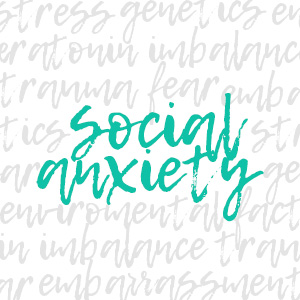Updated 04/17/24
While everyone feels worried at times, too many worrisome thoughts can easily take hold of your overall well-being. Once you start worrying, it can be tough to stop. When it becomes a pattern, worrying too much can create a cycle and pattern of negative, anxious thoughts and behaviors that can be difficult to break.
There are blurred lines with worry vs anxiety. If you constantly feel worried, it’s likely that your feelings of anxiety are negatively impacting many aspects of your everyday life. Thankfully, you don’t have to live like this forever. Online therapists, like those we have here at Talkspace, can help you work through and prevent a worry cycle. Keep reading as we discuss some key tips you can practice on your own to learn how to stop worrying about everything so that you can take back your life.
The Physical and Mental Effects of Worrying
Excessive worrying or the feeling of uncertainty can be all-consuming and tough to control, slowly but surely taking over your ability to live life to its fullest. When you’re nearly worried sick, it can be hard to find relaxation or focus on what’s happening around you. Research shows that chronic worry can also interfere with sleep, which can intensify these adverse effects and, even worse, result in physical health issues.
Worrying can cause anxiety symptoms like nausea or indigestion. Another negative outcome is that it can even weaken the immune system, making it harder for the body to fight off illness. If left untreated, constant worrying can increase your risk for heart disease. For the sake of your health and happiness, it’s important to learn how to stop worrying about everything and to stop yourself from sinking into thought patterns of uncertainty.
“Chronic worrying can have a profound effect on our body. Worrying lets our body know that we’re in constant fear mode. This way of thinking can distract us from living in the present moment and enjoying life.”
Common Triggers of Worry
Identifying worry triggers can help you learn to manage your feelings more effectively in your daily life. While triggers can vary from person to person, some types of worries are more common than others.
Financial stress
Debts, bills, and other financial burdens can be a significant source of stress. As if that’s not enough, worrying about finances can make it harder to manage money effectively, which can exacerbate things, ultimately causing a state of chronic worry. If untreated, excessive worrying or anxious thoughts around how to afford daily life necessities could develop into or be a characteristic of a mental health condition like generalized anxiety disorder or obsessive-compulsive disorder.
Work stress
Whether you’re working long hours, overwhelmed by responsibilities, or dealing with a difficult co-worker or boss, it’s very common to develop anxious thoughts over a job. Keep track of when you feel worried or anxious about work in a worry diary to get a better sense of what’s causing your work anxiety. Doing so can help relieve negative thinking and prevent a work-related panic attack, especially when utilized with the relaxation techniques discussed later in this article.
Health concerns
Concerning health symptoms, or a difficult health diagnosis, can understandably cause intense worries. In addition, many people worry that they’re sick and develop health anxiety even if they don’t have symptoms, resulting in a seemingly perpetual worry cycle that is difficult to break out of. Whether you’re worried about your health, or the health of a loved one, talking about your concerns with your doctor or mental health professional can help you keep excessive worry in check.
Social anxiety
While many people look forward to social events, others find them stressful. Social anxiety can make it difficult to enjoy being in large groups or around people you don’t know. It can even make it difficult for some to be around people they do know. It’s important to find coping mechanisms that make socializing easier to manage. If you experience debilitating social anxiety symptoms in public settings, consider treatment options with a mental health professional, including cognitive behavioral therapy, online psychiatry, or a combination of both.
Public speaking
Public speaking is an extremely common fear that most people experience in some form. It’s normal to be somewhat afraid or nervous before speaking in front of large groups. Still, other situations, like job interviews, can also become a significant source of stress. Practicing in front of friends and family can help you to ease your worries and build confidence.
Relationships
Friendships, romances, and even parent and teacher-student relationships can all be sources of excessive worry, especially when there’s conflict. Conflict resolution skills can help you work through these feelings and build stronger relationships.
Tips to Keep You Grounded and Help You Stop Worrying
There are several effective, easy-to-implement actions you can take when that feeling of dread begins seeping into your day. Try some or all of the following the next time your worry-thoughts interfere with your ability to function productively in your daily life.
1. Take a break
If you’re in an overwhelming situation, the best thing you can do is step away and give yourself a chance to calm down. Step away from the worrying thought and try to calm your mind down. You might want to try closing your eyes and counting to 10. When you return to the situation, you’ll have a clearer head.
2. Focus on your breathing
Slow, deep breaths can slow your heart rate and allow more oxygen into the bloodstream, helping you calm down when your anxiety is high or if you’re experiencing a panic attack.. Deep breathing can help distract you from your worries. You can take deep breaths or try breathing exercises, like the well-known 4-7-8 technique. Breathe in slowly for a count to 4, hold it for a count to 7, then exhale for a count to 8. Repeat 10 times.
3. Try mindfulness meditation
Mindfulness meditation combines meditation with mindfulness. It’s designed to teach you how to be present in the moment instead of spending useless time worrying about the past, present, or future. If you’re new to mindfulness, a guided meditation app is a great place to start.
4. Think positively
When negative thoughts pop into your head, try to immediately counter them with something positive. The power of positivity works — research shows that positive thinking can significantly reduce anxiety and worry. For example, if you’re worried that an upcoming presentation will go poorly, think about how much you’ve done to prepare. Positive thinking is proven to have the ability to improve your state of mind and help you let go of worrisome thought patterns.
5. Keep a journal
Journaling can help you to track worry triggers and work through your emotions. You may want to jot down your thoughts when you wake up in the morning, or you can carry your worry diary with you throughout the day. This can help you to work with the negative emotion by taking each worrisome thought you have and leaving it on the page. After journaling, reflect on “solvable worries” and relieve your negative thinking. Even journaling at night can be an effective way to release anxiety and help you sleep better. When you learn more about your own feelings, you can learn how to not worry so much.
6. Spend time with your pets
Pets have the power to elevate your mood and increase your feelings of emotional support. In fact, spending time with your pet can immediately reduce your anxiety. Caring for a pet can give you a sense of purpose, helping to distract you from a worry period.
7. Recite daily affirmations
Positive affirmations are an easy and effective way to reduce negative thoughts. Every morning, you should look into the mirror and recite a positive statement. Affirmations can help boost awareness of your thoughts so you can change negative thinking patterns over time.
“In many of the support groups, there’s a prayer that is used in recovery, ‘God, grant me the serenity to accept the things I cannot change, the courage to change the things I can, and the wisdom to know the difference.’ This can help categorize our thoughts, so they don’t turn into worry.”
Talkspace therapist Dr. Karmen Smith LCSW DD
8. Exercise
Exercise causes the body to produce endorphins, a chemical that triggers positive feelings. Physical activity can be an excellent way to unwind or work through negative feelings. Whether you hit the gym, go for a run, or walk around the block, exercise can improve your physical and mental health.
9. Volunteer
Volunteering can help you build a stronger support network and give you a sense of meaning. Studies show that engaging in volunteer work can also increase your sense of self-worth, helping you to avoid negative thought patterns. There are many ways to volunteer, which means you can seek out opportunities that you enjoy and are meaningful to you.
10. Seek professional help
If you feel like your worries are taking over your life, the best thing you can do is talk to someone. Worrying all the time can be taxing and overwhelming, but you don’t have to deal with it on your own. A therapist can help you figure out how to stop worrying and find effective coping strategies. Explore mental health treatment options, including online therapy and psychiatry covered by insurance, for effective and affordable care.
It’s normal to worry from time to time, but if your worries are all-consuming, learning how to not worry so much with coping mechanisms and treatment. Don’t let the fact that you tend to worry get in the way of your emotional and physical well-being. Work to break negative thought patterns so that you can lead a healthier, happier, more peaceful life. Seek online therapy with Talkspace to learn how to control your worried thoughts.
Sources:
1. Norell-Clarke A, Hagström M, Jansson-Fröjmark M. Sleep-Related Cognitive Processes and the Incidence of Insomnia Over Time: Does Anxiety and Depression Impact the Relationship?. Front Psychol. 2021;12. doi:10.3389/fpsyg.2021.677538. https://www.frontiersin.org/articles/10.3389/fpsyg.2021.677538/full. Accessed June 7, 2022.
2. Segerstrom S, Glover D, Craske M, Fahey J. Worry Affects the Immune Response to Phobic Fear. Brain Behav Immun. 1999;13(2):80-92. doi:10.1006/brbi.1998.0544. https://pubmed.ncbi.nlm.nih.gov/10373274/. Accessed June 7, 2022.
3. Eagleson C, Hayes S, Mathews A, Perman G, Hirsch C. The power of positive thinking: Pathological worry is reduced by thought replacement in Generalized Anxiety Disorder. Behav Res Ther. 2016;78:13-18. doi:10.1016/j.brat.2015.12.017. https://www.sciencedirect.com/science/article/pii/S0005796715300814. Accessed June 7, 2022.
4. Thelwell. Paws for Thought: A Controlled Study Investigating the Benefits of Interacting with a House-Trained Dog on University Students Mood and Anxiety. Animals. 2019;9(10):846. doi:10.3390/ani9100846. https://www.ncbi.nlm.nih.gov/pmc/articles/PMC6826684/. Accessed June 7, 2022.
Talkspace articles are written by experienced mental health-wellness contributors; they are grounded in scientific research and evidence-based practices. Articles are extensively reviewed by our team of clinical experts (therapists and psychiatrists of various specialties) to ensure content is accurate and on par with current industry standards.
Our goal at Talkspace is to provide the most up-to-date, valuable, and objective information on mental health-related topics in order to help readers make informed decisions.
Articles contain trusted third-party sources that are either directly linked to in the text or listed at the bottom to take readers directly to the source.





